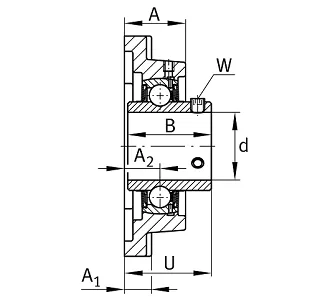Sep . 08, 2024 03:49 Back to list
Metric Spherical Bearings Supplier - High-Quality Bearings for Precision Engineering
Understanding Metric Spherical Bearings A Key Component in Engineering
In the world of mechanical engineering and machinery, the importance of high-quality bearings cannot be overstated. Among the various types of bearings, metric spherical bearings have carved a niche due to their unique attributes and applications. This article delves into what metric spherical bearings are, their features, and why sourcing from a reliable supplier is critical for operational success.
What are Metric Spherical Bearings?
Metric spherical bearings are specialized bearings that can accommodate misalignment and provide a self-aligning capability, which makes them incredibly versatile. These bearings consist of an inner ring with a spherical shape and an outer ring that is usually cylindrical. The unique design of the spherical inner ring allows for rotation and movement in multiple directions, which is essential in applications where angular misalignment may occur.
Features of Metric Spherical Bearings
One of the standout features of metric spherical bearings is their ability to handle radial and axial loads simultaneously. This capability makes them ideal for various applications, such as in automotive components, agricultural machinery, and industrial equipment. Their high load capacity and durability ensure long service life, minimizing the need for frequent replacements.
Metric spherical bearings are also designed to operate under severe conditions, including high temperatures and contaminated environments. Many come with seals or shields that protect against dirt, dust, and moisture, further enhancing their longevity.
metric spherical bearings supplier

Another feature worth noting is the availability of various sizes in metric measurements, which aligns with international standards. This ensures that engineers and manufacturers can easily find the right bearings suited for their specific needs without facing compatibility issues.
The Importance of Sourcing from a Reliable Supplier
When it comes to sourcing metric spherical bearings, selecting a dependable supplier is paramount. A reputable supplier not only guarantees the quality of the bearings but also provides essential services such as technical support and engineering assistance. This is particularly important for businesses that may require customized solutions suited to their unique applications.
Quality assurance is another critical factor. A reliable supplier will implement stringent quality control measures throughout the manufacturing process, ensuring that each bearing meets high performance and safety standards. This reduces the risk of premature failure, which can lead to costly downtimes and repairs.
Additionally, a good supplier will stay updated with the latest technological advances and innovations in bearing design. This knowledge can help clients choose the most suitable products and incorporate advanced features that enhance overall machinery efficiency.
Conclusion
Metric spherical bearings play a vital role in various industrial applications, owing to their unique design and functionality. The choice of a trustworthy supplier can significantly impact operational efficiency and long-term cost savings. Businesses must prioritize quality and reliability when sourcing these essential components to ensure smooth and uninterrupted machinery performance. By aligning with a reputable supplier, engineers and manufacturers can leverage the advantages offered by metric spherical bearings, laying the foundation for success in their projects and operations.
Latest news
-
25MM 2 BOLT UCFLX05-14 Flange bearing unit( oval)
NewsMar.07,2025
-
4 bolt UCF 200 series Pillow block bearings
NewsMar.07,2025
-
25MM 2 BOLT UCFLX05-14 Flange bearing unit( oval)
NewsMar.07,2025
-
UCF216-50 4-Bolt Flange Housing Square Bearing
NewsMar.07,2025
-
25MM 2 BOLT UCFLX05-14 Flange bearing unit( oval)
NewsMar.07,2025
-
spherical roller bearing material exporter
NewsMar.07,2025





